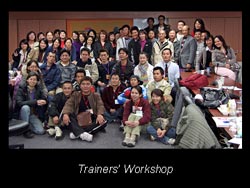The overwhelming majority of trainers in Asia use traditional, correction-based training methods. While some use lure and reward, clicker training is not well known. The handful of clicker trainers in that part of the world have few, if any, training resources to support them, so all-positive training methods have not yet found traction. How then did Virginia

Virginia Broitman
Broitman and Sherri Lippman, two trainers from the Commonwealth of Virginia, find themselves teaching a clicker training workshop on the other side of the globe?
The invitation to train in Taiwan materialized almost by chance. In October 2005, Bill Peña, KPCT's Director of Marketing, was attending the H.H. Backer show (a major pet-product conference). Bill was working the KPCT booth when a man named Mr. Wu stopped to talk. "I started telling him about our products," Bill explained, "and he seemed to be interested, but said that first he needed to get his trainers up to speed with clicker training. So I mentioned that we also provide seminars for a variety of purposes, and could possibly arrange to send some expert clicker trainers to his location. I asked where exactly he was from, and when he said Taiwan, I told him I'd been studying Qi-Gong with a Taiwanese Kung Fu master. His eyes widened and he seemed to really connect with this, asking me about it before the conversation moved on."
When Mr. Wu got back to Taiwan, he called KPCT to discuss seminar arrangements. Kung Fu may have been the unlikely connection that sealed the deal, but Virginia and Sherri were booked.

Sherri Lippman
The workshop, based on Virginia and Sherri's How of Bow Wow seminar, would be separated into two courses—one for professional trainers, and one for pet owners—and sponsored by Mr. Ling, the owner of a training business centered largely on "board and train." Considered the norm in Asia (and popular with many Americans), pet owners send their dogs away for 1-4 months and the animal returns "trained." Schutzhund and basic obedience are both trained at Mr. Ling's boarding facility, as is agility—using a full course of high-end agility equipment.
Sherri and Virginia were initially hesitant about the arduous voyage—over twenty hours and three different flights. They were also intimidated by the language barrier. Even with the help of translators, spontaneous communication would be difficult. "Basically, Virginia convinced me to go," admitted Sherri. "I kept thinking about how we're going somewhere very far away, to explain something brand new—in a language we don't speak and in a culture we don't get. Why would we want to do that? But I finally thought, OK, when am I ever going to get a chance to go to Taiwan?"
Loading the clicker
Preparations for the trip began. "It's such a completely different culture," said Sherri. "I didn't want to be rude, so we read a bunch of things before we went, to prepare ourselves culturally. Debi Davis sent us a lot of stuff about the culture—what to do and what to avoid."
In November 2005, at ClickerExpo Minnesota, Virginia and Sherri met with Vicki, a Taiwanese translator and clicker trainer who would become an invaluable part of the training team. Vicki had attended graduate school in the US and earned a degree in animal behavior. She'd also taken a six-week course with Jean Donaldson at the San Francisco SPCA.
Vicki helped Virginia and Sherri to better understand what to expect. Unlike in the US, trainers in Taiwan are overwhelmingly male. This gender difference would make for another new dynamic. Sherri and Virginia hoped their audience would be open to the radically different approach of clicker training, especially coming from two American women. "It was amazing that Mr. Ling was so open-minded to a new way to train," observed Virginia. All of the trainers who worked under Mr. Ling were encouraged to attend the seminar.
Introducing the cue
In February 2006, Sherri and Virginia flew to Taiwan. They arrived exhausted. Mr. Wu, Vicki, and the other translators came to the airport to meet the visitors. Sherri and Virginia felt completely welcomed. "They were so wonderful. If they had been unpleasant or unapproachable, the visit and the workshops would have been difficult," said Virginia. "It was so intimate because we completely relied on them to translate and get us around," added Sherri. "We so enjoyed the core people. We came to depend on them—and missed them when we left."
The day before the seminars began, Virginia and Sherri attended a press conference celebrating the year of the dog with TV and newspaper reporters, as well as some of the seminar participants. "We created a media presentation, with photos and video clips, showing what could be done with clicker training. We had photos of Panda, footage from Ken Ramirez showing husbandry applications, Kathy Sdao with a walrus, search and rescue—all examples of clicker trained animals. People were really interested. We also had some demo dogs, which went very well."
Trainers' workshop
Vicki had already translated Sherri and Virginia's PowerPoint teaching presentation into Chinese, and had added a few subtitles to the video segments where she thought clarity was needed. During the workshop, the team had two computers running side by side, which helped the process unfold smoothly. Vicki had printed out copies of the presentation notes for all attendees, so that they could follow along and have something useful to take home.
During the workshops, Vicki served as the primary translator, taking turns with Shell and Mel, the other translators. "We learned to get in to that rhythm of talking and pausing for the translation," Virginia said. As a clicker trainer, Vicki understood the learning theory and science of operating conditioning—which made for invaluable translation. "She knew what we were talking about, and the students' culture, and where there might be a gap in understanding," explained Virginia. "We would talk for a minute and Vicki then would talk for five minutes, adding the important extra context." As Vicki's translation seemed to go on and on, Sherri and Virginia would exchange glances, wondering, "Did we really say all that?"

To watch a slideshow of the
trip to Taiwan click here .
The first day of work began with introducing the trainers to clicker training and helping them with mechanical skills, such as how, why, and when to fade, why we don't use cues at first and when to add them, and went into all the basics of training using the clicker.
Many of the trainers came from out of town and couldn't bring their dogs. The training school had arranged to have shelter dogs and puppies for demonstration and practice. "Dogs with no training experience at all are far better to work with than dogs that have been trained already using traditional techniques," said Virginia. "If they were trained with physical prompts or lures, they tend to wait for the handler to jumpstart behaviors, so it can take longer to get them to offer behaviors during the shaping process."
The class split into groups to work on skills. Sherri and Virginia would go around the room, translators in tow, and work with individuals. Some of the trainers seemed to think that the early exercises were silly—but everyone got involved and saw results. "We had varying degrees of interest. But they seemed to be learning things and asking questions," recalled Virginia. "Some people were totally committed to getting it—probably newer trainers. Of the ones who had been training for a while, we needed to understand how committed they were, and quickly decide on what suggestions we could make to help them figure out how to transition. Some of them may have been there just to check it out, and others seemed sincerely interested in giving it a try. Some were totally enthusiastic about clicker training and you knew they were going to carry on in that vein."
Sherri described her teaching experience, and trying to break through the barriers to imparting something new and very different. "We're also women—American women—and most of the trainers were men. You're working with them and you know that they're force trainers, and you want them to listen to you. You want to earn their respect, at least. I wanted to set up the odds in my favor by doing every little thing I could do to help the situation. I made them teach me a few Chinese words, which they would applaud for. I didn't expect that. I just wanted to show ‘I'm making an effort, I'm being polite, trying to earn a little more credibility.' It's hard enough without the cultural issues." Virginia agreed. "Largely, they were respectful. We weren't saying ‘our way is better,' but here were these two women from America coming over saying ‘here's what you should do.'"
Despite the sensitivities, there were moments of understanding. Asked if there was a seminal moment during the trainers' workshop, Virginia said, "I think that it wasn't an ‘ah-ha' moment, exactly, but a point of empathy on our part. On the second day, we could see that the trainers were trying to understand how to convert, and how to practice so that they could feel competent. These people have so few resources for follow-up learning. Here, we have so many opportunities to learn more. There, they have very little, and if they don't speak English they have almost nothing to work with. Vicki, our translator, has just translated one of Patricia McConnell's books into Chinese, which is wonderful. But just some basic clicker stuff is essential."
Pet owners' workshop
The workshop for pet owners met with less resistance than the trainers' session. "The pet owners were more open in general, because they weren't invested in the same way," said Virginia. "It wasn't their longstanding business or their livelihoods."
After classroom time and working in groups, Virginia and Sherri spent a lot of afternoon hours troubleshooting real-life issues. "They had really intelligent questions," said Sherri. "I thought they picked up the training very fast—faster than the trainers. We were impressed with their handling and enthusiasm. We did get some cat questions as well, which shows that they were thinking globally."
Experienced trainers look at the cause of behavioral issues. "A lot of the dog problems over there are problems induced by the environment," Sherri observed. "High-rise buildings, kept in apartments all day, no dog parks when they do get outside, no place to run—and surprise, the dog has some on-leash issues. The Taiwanese seem to love Siberians. Let's put a Siberian in an apartment for 22 hours a day—and why does he chew stuff up?" Problems like these are often solved by management, not by training. "You can ask how to deal with a dog that's aggressive on-leash—but is that really the problem? Or is it just that he hasn't spent time with other dogs?"
Sherri noted that there were differences in the workshop approach aside from the language barrier. "Here, you can touch people and move them around on the floor, to help them understand something, although I always ask first before I touch someone. Vicki had explained beforehand that in Taiwan it's not OK to touch someone else's skin in our environment. So we knew right off that we wouldn't be directing people in the same way. But I learned I could direct people by pulling gently on their sleeves, rather than touching their hands, and this worked. As people were learning and we were doing the learning sessions, I could see the ‘light' thing when I moved their hand [via a sleeve]. I could see that they got it, their faces lit up. So the language barrier was less noticeable when we could work together. And I think they appreciated our respect for their culture. It isn't dogs we train at all. It's people. So you don't want to do anything that's going to debilitate their learning."
Click and treat
One of the greatest triumphs of Virginia and Sherri's workshops involved their main translator, Vicki. "Vicki works at a business with a guy who does a lot of luring," explained Virginia. "He was pretty confident in his abilities, and didn't think so much of Vicki's approach. Well, after he'd attended the trainers' workshop, he called Vicki and asked her if she would meet with him and another trainer and help him learn English. It turns out he wanted to convert his whole program to clicker training. Vicki was thrilled and shocked. This man had not shown her a lot of respect before as a training authority—she is very quiet and modest. She was really thrilled, and this made the whole workshop worthwhile."

Taipei Fox
The eight days passed quickly. After a final half-day of sightseeing, it was time to go home. Virginia and Sherri arranged for a very special souvenir. They adopted one of the shelter dogs. Her name is Taipei Fox. She had to stay in Taiwan for a month for a rabies shot before flying to the US; during the wait, she stayed with Mel, one of the translators, getting healthier. Currently, Taipei Fox is living with Virginia, and has settled in well.
Ultimately, the trip was a success. Clicker training sells itself—no matter what verbal language is spoken—once people have the opportunity to try it firsthand and marvel at the results. Professional trainers, however, need to feel supported in order to transition from traditional methods, and at this time, sufficient resources are not readily available in Taiwan to encourage those trainers who may want to pursue all-positive methods but need reassurance that such a path is viable.
Virginia and Sherri have many new projects on the horizon—working together as well as independently. Virginia is developing the script for a new DVD she's producing, and offering private lessons and behavior consultations. Sherri is working on a DVD illustrating training the find and re-find for search and rescue dogs (one of her areas of expertise) with a 10-week old puppy. She'll return as a presenter at the next ClickerExpo season.



Spread the good (clicker) news!
Laurie Luck
Certified Pet Dog Trainer
Smart Dog University
http://smartdoguniversity.com
This is great to hear -- the more widespread clicker training, the happier the pets of the world!
Keep up the good work Sherri and Virginia!
Post new comment